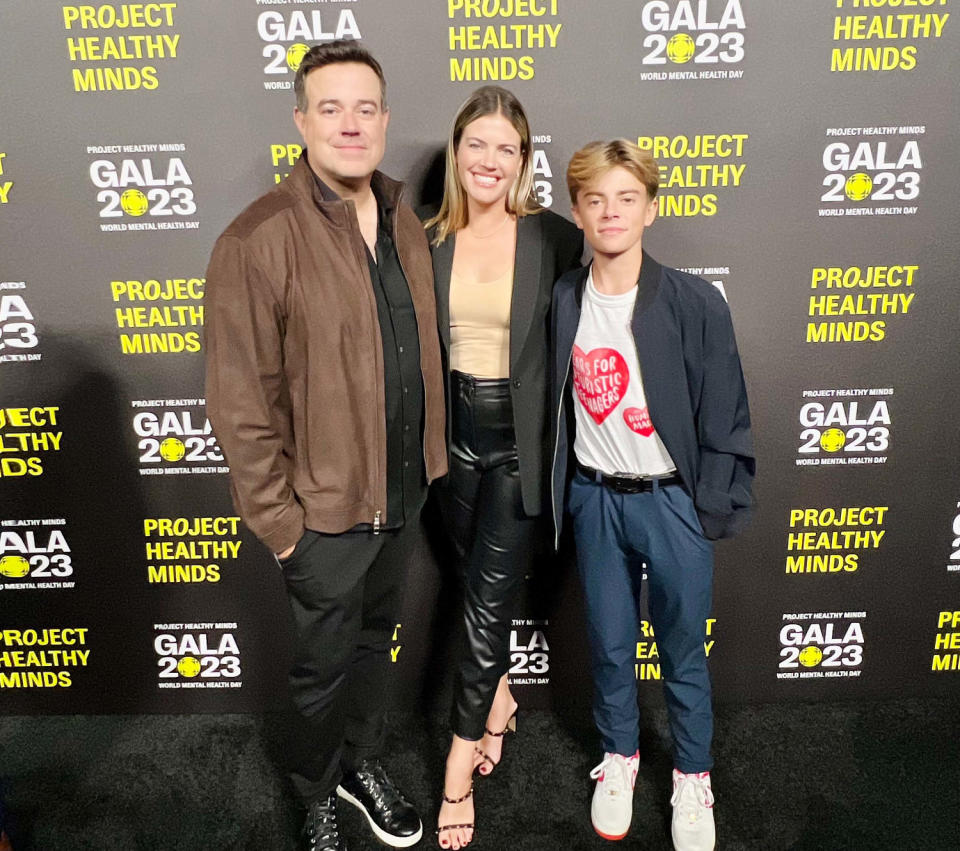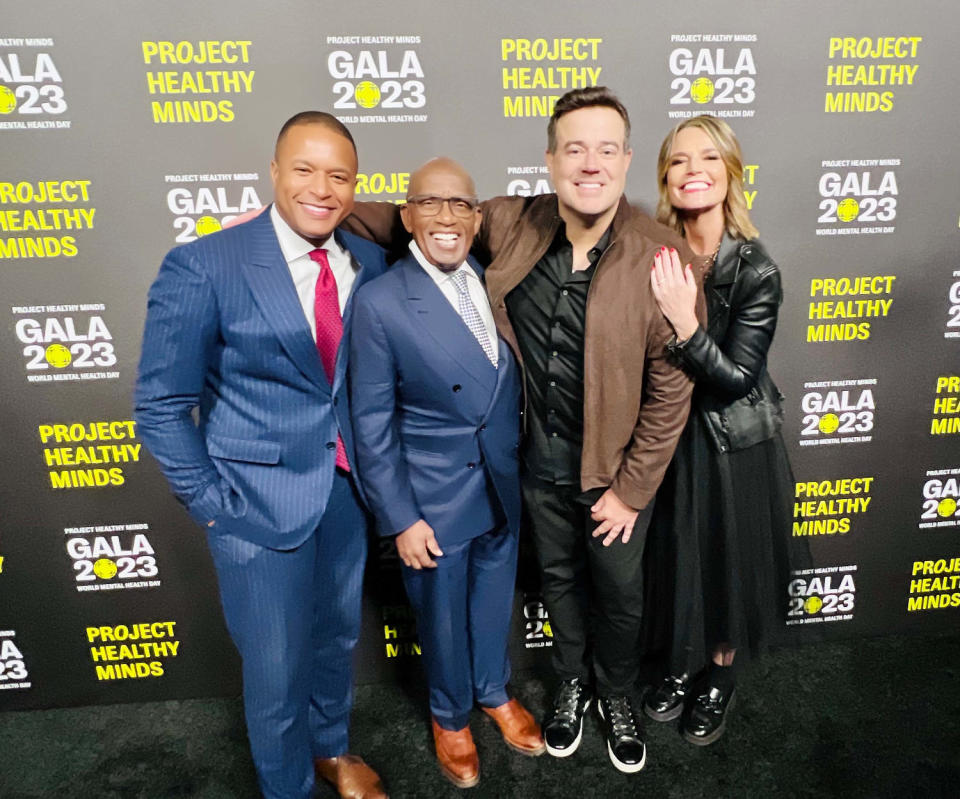Carson Daly gives heartfelt speech about his mental health journey. Read it here in full

On Oct. 10, 2023, Carson Daly hosted the inaugural gala for Project Healthy Minds, a non-profit focused on removing the stigma around mental health and helping people access resources. During the night, he gave a speech about his involvement with Project Healthy Minds and his own mental health journey. Below is the TODAY co-host's speech in full.
I do want to give a little context to my relationship to Project Healthy Minds and this whole movement here. I had sort of the privilege of being around when PHM, as we call it, was born. It was actually six years ago this month.
My friend Logic had performed his song at the VMAs in 2017. It was a song about somebody with depression calling the National Suicide Prevention Lifeline. He did it on the VMAs. And I read an article about how just in the hours after the VMAs, the call skyrocketed to the hotline. It was up by 50%.
Right after that, I interviewed Logic and some guy named Phil Schermer (the CEO of Project Health Minds). Thats where they announced during the interview the birth of Project Healthy Minds.
And that’s when I decided that I didn’t just want to help promote them, I wanted to join them. I wanted to help in the fight.
I had my own mental health story to tell. And I said to Phil, "If you ever need me, let me know."
He called me 20 minutes later.
He said, "You're in." Signed me up on the spot, he’s very good at that. And in the three years since, I’ve watched him work his tail off with his group that are all here tonight. They are helping to change the narrative around mental health. That’s the mission of what we’re here to support tonight.

I want to just quickly share a little bit about my mental health story and how I became involved in the community. Before TikTok and Instagram, before Facebook, before all of that, there was "Total Request Live."
The OG.
"TRL," if you don’t know, was television for a generation. It was where you went to interact with your favorite singers and celebrities. It’s how MTV brought small-town kids the world’s biggest stories. It’s where thousands of screaming teenagers tangled Times Square traffic every single day.
It was a safe space for young people. And I was a safe host. I was basically the babysitter for the latchkey kids of America.
It’s also where, one September day, I thought I was going to die.
I was in my dressing room and I could sense all the normal live buzz of the show before it went on. I could hear the crowd outside. I could hear horns honking, normal "Total Request" chaos, very usual.
Then something very unusual happened to me.
Out of nowhere in my dressing room, I felt what I can describe as a snap in my brain. My heart started to race and fear went through my body. It was like somebody cracked one of those cold compresses at a little league game and put it on my neck. I could see my producer talking to me in the doorway, totally normal expression on his face, saying something about Hanson, probably. I couldn’t hear him. It looked like he was talking in slo-mo. I was literally leaving reality. I thought, my God, I’m having a a stroke in front of Hanson. It passed in 30 seconds, but it felt like 30 minutes.
Somehow I was able to get through it. I did the show on autopilot. You know. Number six, here’s 98 degrees, just did my thing. But the whole time, beneath the surface, I was absolutely terrified that whatever had just happened to me, it could happen again at any moment.
So right after the show, I went to my doctor and I said, "I need help." He ran an entire battery of tests. I said, "Give it to me straight. Am I dying of cancer? What is it?" He was laughing. He said, "You’re 100% physically healthy." Bullshit. There’s no way. I felt my brain snap in the dressing room.
And he said, "Your real problem is that your life is unmanageable. And what you had was called a panic attack."
I’ve never heard of a panic attack, much less considered it. What was the trigger of this panic attack? Was it Nick Lachey? I don’t know. As it turned out, the panic attack was a symptom. Stress and anxiety were the cause. I needed to slow down. I needed to make my unmanageable life manageable.
So I fired my manager. Slowing down didn’t do the trick. I kept having panic attacks. If you’ve never had an intense fight or flight response, the urge to literally drop everything and run, it’s like an out-of-body experience. We call it derealization. Sometimes I can even see myself from above, like I was at Snoops house and he gave me the shit that killed Elvis. This was not an ideal way to live.
I started thinking, what are the triggers for these panic attacks? How can I avoid them and eliminate them?
I had a panic attack in Aspen, Colorado. Fine. No more altitude for me.
Panic attack at midnight? Going to bed at 10.
Panic attack anywhere? Well, I guess it’s time to become a recluse and stay at home, like Howard Hughes. That’s where I was literally headed, full-blown agoraphobia.

And that’s when I decided to take the single most important step in my mental health journey. It’s not riveting. So hold onto your seats. Ready for it? Here’s what I did. I took the wildest leap.
I opened up and I talked to a friend.
I did that. Rebel stuff, right? And he looked at me and he said, "Man, I know exactly what you’re talking about. I had those all through school growing up." And just hearing him say that was revelatory.
I was so happy to learn that I wasn’t the only one feeling this way. I wasn’t alone. He said I need to talk to a professional, not a doctor, a mental health professional. And again, this is something I did not know existed. I didn’t grow up with any of this. We didn’t talk about our mental health. It was, "Suck it up."
I found a therapist named Dr. Oakley, who is a director of psychology at UCLA. I liked his vibe. First session, Dr. Oakley says to me, "I want you to hyperventilate in this paper bag. And we’re going to induce the symptoms of a panic attack on purpose."
And I looked at him like he was the one who needed help. And I said, "You gotta be kidding me. Do you have any idea how hard I try to not have those? I almost had one in your parking lot and went home." But he was right. Exposure is important. Taking the time to be vulnerable and learn about yourself is important.
It was time to stop running and it was time to start working on myself.
And over the years, I put in the work to manage and ultimately admire my anxiety.
I learned that the brain can send these false alarms to your body telling you that there’s an imminent threat, like there’s a saber-toothed tiger on the stage about to rip my head off.
But that that doesn’t exist. It’s not actually true. I learned to manage it with a regiment that smart people helped me create: meditation, breathing, taking a cold plunge, focusing on working hard for my family and taking my meds, the prescribed kind, not the kind from Snoop. But ultimately, I came to accept that this is who I am.
And not only do I accept it. I’m stronger because of it.
That doesn’t mean I’m never going to have a panic attack again. The body can always trick the mind. I had one hosting "The Voice." Twelve million people watching. I felt the wave come over me live on NBC. Not a good time to lose your shit. Thought I was going to pass out.
So I just held on. Right hand clutching the microphone, smiling is what you see. Left hand in the pocket. I grabbed my left thigh so hard, I started to bleed. Thirty seconds is what it lasted. But again, it felt like an eternity. But I made it.
In fact, it was worried I was going to have a panic attack today with the duke and duchess or tonight, right here in front of all of you.
I may never cure my anxiety, sometimes it’s tough, but it’s more important that I had the bravery to share my story just in case. It helps somebody the way that my friend helped me.
I think there’s three chapters to the arc in our society of mental health. The first chapter was when mental health was considered something to keep hidden in the shadows. It was something to be ashamed of. That chapter, unfortunately, stretched for the entire history as a species.
The second started a few decades ago when doctors and researchers did the hard work of changing what we know about science. Advocates did the hard work of changing the hearts and minds. Brave people, sometimes risking their own careers and their reputations, came forward to share their mental health struggles and each of them made it easier for 10 more of us to come forward.
And that brings us to the third chapter in the arc of mental health. And the reason that we’re all here tonight. Building a world where everyone knows that mental health isn’t something to hide from. But a journey to take openly and a journey where you’ll find support along the way. We have a lot of work to do.
We have a lot of work to do. Sixty-five million Americans are going to experience a mental health condition this year. That’s four times the number of Americans that will be diagnosed with cancer. And it takes far too long to reach them.
I think about it this way: If you roll your ankle on a basketball court in a pickup game, how long does it take you to go to the urgent care to get a diagnosis? Ten minutes. However long it takes you to get there.
The time it takes between somebody experiencing their first mental health symptom and actually getting help is 11 years. Eleven years. And that’s an average. It takes a lot longer in poor communities marginalized communities, communities of color. The distance to access is further and the stigma is greater.
And all of that is why we have to reach people earlier. We have to show them that they’re not alone.
There is everybody going through something that we cannot see. We have to convince people that grappling with your mental health does not make you weak learning about it, managing it, making it work for you, turning your vulnerability into your greatest strength. That’s what makes you strong.
Mental health is no longer the Scarlet A on our chest. It is the bright red 'S' on our chest. We’re superheroes. We’re the avengers of a galaxy, jocks and misfits, all with their own issues coming together to help people and who knows, maybe even save the world.
That’s why we’re here tonight to celebrate our own journeys. But more importantly, to help others take their own to build a better world. And I am profoundly grateful to everybody here tonight for joining all of us at Project Healthy Minds in that mission. Thank you very much.
This article was originally published on TODAY.com

